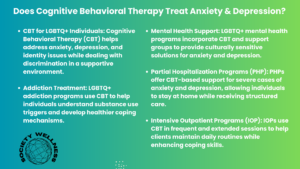An effective strategy such as Cognitive Behavioral Therapy is applied to treat anxiety and depression. It empowers individuals to see what is happening to them and to be the ones who, ultimately, make changes toward better mental health with LGBTQ+ mental health programs.
Young adults with diverse sexual orientations often have more severe mental health challenges since they also have to endure various forms of discrimination.
What is Cognitive Behavioral Therapy?
CBT is a type of therapy that believes feelings, thoughts, and behaviors are linked together. They can either reinforce each other positively or lead to the development of new, stronger behaviors.
One of the strongest qualities of this therapy is that it teaches individuals to handle anxiety and depression in multiple ways of their choosing.
LGBTQ+ Cognitive Behavioral Therapy
In the case of LGBTQ+ people, CBT therapy also focuses on addressing the discrimination targeting them and the identity issues they have to deal with. The therapy involves having a chance to delve into your thoughts and feelings without worrying that you will be criticized.
Supportive therapists help both individuals and families with the problem of discrimination, which is a source of anxiety and depression.
LGBTQ Addiction Programs
LGBTQ+ youth cope with the reality of their sexuality using drugs. It is a veil under which a problem is hidden.
These LGBTQ addiction programs use the technique of CBT to help people in the first place realize why they use drugs and then adopt more useful strategies for handling stress. They are very helpful in creating an open and honest environment both about addiction and mental health.
LGBTQ+ Mental Health Programs
LGBTQ+ mental health programs use CBT to work with those with anxiety and depression. There are individual therapy sessions as well as other services like support groups, among others, which, together with the culturally sensitive approach, give the clients various solutions to their problems.
LGBTQ Addiction Treatment Programs
LGBTQ addiction treatment programs focus on the specific issues faced by LGBTQ+ people who progress through the recovery process. These programs use CBT to help individuals recognize triggers for substance use and develop strategies to avoid relapse. With the treatment of mental health disorders and addiction, these programs work towards a longer healthier lifespan.
Partial Hospitalization Programs
When anxiety and depression become severe, then a LGBTQ partial hospitalization program (PHP) can be of great help by offering tremendous support while the person stays at home. PHPs use CBT to teach coping and symptom management skills. This level of care fits people who require more help than ordinary therapy yet do not need to be observed around the clock.
Intensive Outpatient Programs
An intensive outpatient program (IOP) is an outpatient program that extends care beyond traditional outpatient therapy including more frequent and longer sessions. IOPs use CBT to aid people with anxiety and depression in enhancing their coping skills.
This kind of program is suitable for those who need extra support but at the same time do not want to give up on their daily routines.
How CBT work? Meet Society Wellness!
In CBT sessions, the LGBTQ addiction centers therapist helps to identify negative thoughts and behaviors. For instance, a person who has anxiety might think that something bad will happen if they make a mistake.
The therapist helps the individual re-evaluate the situation by looking at the facts and considering different viewpoints. At the end of the day, this strategy is very helpful as it allows people to think in a more balanced way, therefore, lowering the symptoms of anxiety and depression.
So whether you belong to the LGBTQ community or others, we have special CBT programs that create a safe space to tackle your unique issues. Call us today at (888) 598-9510 or fill the contact form!
FAQs: How Cognitive Behavioral Therapy Helps with Anxiety and Depression
Is CBT effective for anxiety and depression?
Yes, CBT is a highly effective treatment for anxiety and depression, with a strong evidence base supporting its efficacy.
What techniques are used in CBT?
CBT techniques include cognitive restructuring, exposure therapy, relaxation techniques, and problem-solving skills training.
How long does CBT take to work?
The duration of cognitive behavioral therapy varies depending on the individual and the severity of symptoms. Typically, improvements can be seen within a few sessions.
Can CBT be used with other treatments?
Yes, CBT can be combined with medication or other therapies for a comprehensive treatment approach.
Is CBT covered by insurance?
Many insurance plans cover CBT, but it’s essential to check with your provider.
What should I expect in a CBT session?
CBT sessions involve collaborative work with a therapist to identify negative thought patterns and develop coping strategies.

